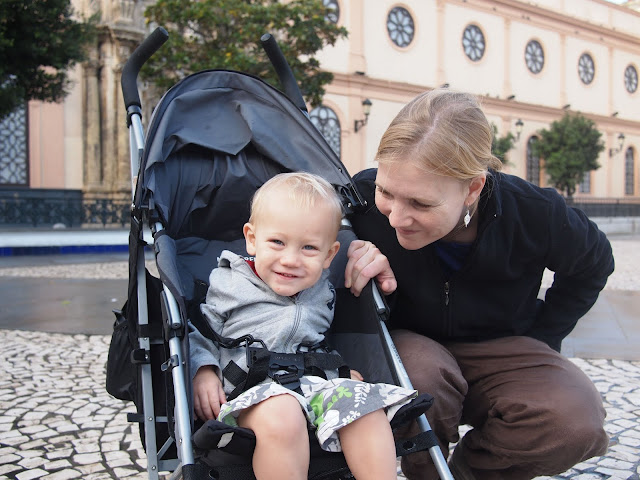 |
| Advice for traveling minimalists: Avoid a car seat (or at least a large one) at all costs. Traveling with all our stuff in S. Margherita |
I have some questions about responses to poverty and inequality that I'd love your comments on, but my thoughts are only quarter-formed. So in the interim, I wanted to update you on how things are going with settling down in Cape Town. We're staying with my parents, so there's less of a rush to equip our house with a lot.
Starting over means buying/acquiring stuff over, and that's really striking at the moment. We knew we would have to buy many things, but it's a strange feeling nevertheless. It's also quite striking that in South Africa, the benchmark for trash is much, much lower. Which means even pretty basic old tables (that we could pick up on the street in Boston) are around R200-300 (US$30-50).
I have conflicting feelings about how best to acquire stuff, because I want to have things that look consistent and nice (particularly in the kitchen) but that's often both expensive and wasteful. So I'm waiting for creativity to hit, as there is a third way that's consistent, beautiful, cheap and second hand. The third option requires more time.
1. Being with my parents and having a lot of family around is great, because we're able to get some of their things and experience their welcome.
2. The two-economy South Africa is apparent when we try shopping in Woodstock second hand shops, or in certain parts of Observatory. There are things that are
way more affordable if you avoid large chains. There's a lot of junk in pawn shops, but all we need is that one good thing.
3. Having a smallish house is really good when we're starting over. It's also good we don't have a lot of clothes or toys or books to store, because our house has not one cupboard right now.
4. Starting over with Eug is really fun, because we can balance each other out. Eug is very steady and measured in thinking through our needs, and he's ok waiting on things that are not absolutely 100% essential. For January move in, we're hoping to have
- a stove (Gytha and Will's old stove- Thank you!),
- A bar fridge (bought today for R1000)
- a second hand washing machine (bought today for R1000)
- a deep freeze
- bikes and a bike seat for Noah
- mattresses and bedsheets for Eug, Noah and I.
- towels
Thinking in terms of absolute needs was very freeing, as buying 10 things seems manageable and affordable. I'm more impulsive, but also more frugal and very conscious of waste. I would gladly rush around on Gumtree (craigslist) and pick up deals, but the reality is that we are working, taking care of Noah, I'm preparing my dissertation proposal, and we're getting reacquainted with being part of our family. So we're busy.
5. Five Concrete Gardener-like things I'm very excited about as we get closer to our move in date are:
- Having a bar fridge and a deep/chest freezer. I'm hoping this will help us eat fresh produce, and waste less food. The fridge is large enough to cool water or keep vegetables, eggs and milk for a few days. Then, I hope the chest freezer will store some leftovers (if I can figure out containers). The tiny fridge should be quite full, and it's also much more energy efficient than a larger fridge-freezer.
- Having a small concrete area in which to concrete garden (May the concrete one day be removed). It's like having a big balcony on both sides of the house. This means tomatoes, swisschard, three small potted trees, one vine, and some of the bonsai are finally coming home to me! I started about 10-15 bonsai over the years, and about 5 will be able to come to our house, and the remaining bonsai will be shared or repotted. Bonsai give me huge amounts of joy, despite the fact that they don't bring anything food like.
- We're not sure exactly when they'll be installed, but we're really looking forward to buying both a PV solar panel and a solar water heater. They'll pay for themselves in about 3-5 years, and I'm hoping to move the little house towards being energy independent over time.
- Biking around
- Painting and fixing up furniture. Eug and I have chosen a couple of colors to use throughout the house, and we're just going to use wood stain and paint on old furniture. Hopefully this means that we'll only need to buy mattresses new.
I'm learning through this process is that it's good to be willing to balance a lot of competing desires, and to hold on to ideals lightly. The reality is that some of our choices might turn out to be wrong (financially or otherwise), but that's ok.

























